Bill Surname Ancestry ResultsOur indexes 1000-1999 include entries for the spelling 'bill'. In the period you have requested, we have the following 328 records (displaying 151 to 160): Single Surname Subscription | | | Buying all 328 results of this search individually would cost £1,820.00. But you can have free access to all 328 records for a year, to view, to save and print, for £100. Save £1,720.00. More... |
These sample scans are from the original record. You will get scans of the full pages or articles where the surname you searched for has been found. Your web browser may prevent the sample windows from opening; in this case please change your browser settings to allow pop-up windows from this site. Creditors and solicitors in England and Wales
(1847)
Perry's Bankrupt and Insolvent Gazette, issued monthly, included lists of bankruptcies and stages in the liquidation of the estate, payment of dividends, and discharge. The initial entry in this sequence gives the name of the bankrupt (surname first, in capitals), the date gazetted, address and trade (often with the phrase dlr. and ch., meaning dealer and chapman); the dates and times and courts of the official processes of surrender; the surname of the official commissioner (Com.); the surname of the official assignee; and the names and addresses of the solicitors; the date of the fiat; and whether on the bankrupt's own petition, or at the demand of petitioning creditors, whose names, trades and addresses are given. This is the index to the names of the solicitors and petitioning creditors, from the issues from January to December 1847.BILL. Cost: £6.00.  | Sample scan, click to enlarge

| Traders and professionals in London
(1851)
The Post Office London Directory for 1851 includes this 'Commercial and Professional Directory', recording about 80,000 individuals. BILL. Cost: £4.00.  | Sample scan, click to enlarge

| Middlesex Sessions
(1625-1666)
Incidents from the Middlesex Sessions Books. These are abstracts of sessional orders, minutes of criminal cases, memoranda and other entries of record taken from the volumes of Gaol Delivery Register, Books and Rolls, Sessions of Peace Register, and Process Books of Indictments for the county of Middlesex from the death of king James I to the Great Fire of London. The references at the end of each item indicate the volume in question, the abbreviations being G. D. for Gaol Delivery, S. P. for Sessions of Peace, and S. O. T. for Session of Oyer and Terminer; occasionally preceded by S. for Special or G. for general, or followed by R. for Roll or Reg. for Register. It should be noted that, in the case of 'true bills' or indictments, the abstract starts with the date on which the offence took place, the date of the conviction &c. being at the end of the entry. These abstracts, prepared by John Cordy Jeaffreson for the Middlesex County Record Society, are far from being a complete calendar of these extensive records; his purpose was, in part, to notice 'every parchment that should exhibit a famous person's name or any other feature of personal interest'.BILL. Cost: £4.00.  | Sample scan, click to enlarge
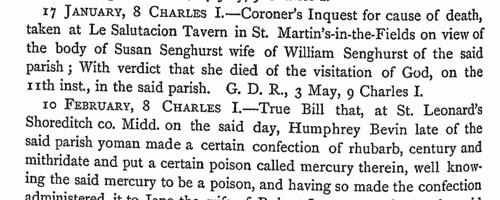
| Intended brides and grooms in East Sussex
(1670-1739)
Sussex was in the Diocese of Chichester, divided into two archdeaconries - Chichester for west Sussex, Lewes for the east. Both archdeaconries exercised active probate jurisdictions, and issued marriage licences. Those issued by Lewes Archdeaconry court in this period were recorded in a series of registers (E3, E4, E5 and E6), which were edited by Edwin H. W. Dunkin and published by the Sussex Record Society in 1907. Each entry gives the date of the licence, the full names of bride and groom, with parish for each, and often stating whether the bride was a widow or maiden. To obtain a licence it was necessary for the parties to obtain a bond, with two sureties. One of these was often the prospective husband; the other might be a relative or other respectable person. From the bonds the names of the sureties were also copied into the register, together with the name of the church at which the wedding was intended to take place. These details are usually given until 1701; thereafter sureties and intended church are usually omitted. One deanery in Lewes archdeaconry, that of South Malling, was an exempt jurisdiction (or peculiar) of the Archbishop of Canterbury, which had separate probate and issued its own marriage licences, also recorded in a series of registers. This volume also includes the contents of registers C1 to C6 of the Deanery of South Malling, for marriage licences from 1620 to 1732. The details recorded are as with the main series, similarly lacking names of sureties and intended church after 1721. South Malling deanery comprised the parishes of Edburton, Lindfield, Buxted, Framfield, Isfield, Uckfield, Mayfield, Wadhurst, Glynde, Ringmer, St Thomas at Cliffe, South Malling and Stanmer. BILL. Cost: £4.00.  | Sample scan, click to enlarge

| Anglican clergy
(1930)
Crockford's Clerical Directory listed all Anglican clergy in the British Isles, India, the colonies, Europe, Asia and South America. The 59th annual issue, for 1930, is based on returns from all the individuals listed. The details given are: name (surname first, in capitals) in bold, prefixed by an asterisk in the case of university electors, and by a dagger whether the return had not been made, or it had been imperfectly filled up; name of theological college and/or university, and degrees, with years; a bold d followed by year and diocese signifies date of ordination as deacon and by which bishop; then a bold p, similarly for ordination as priest; posts (C: curate; I: incumbent; V; vicar; R: rector) with parishes and years; address; telephone number; and lists of books &c. where appropriate. In the case of the man then holding an English, Irish, Scottish or Welsh benefice, additional details are given - a bold P signifies the patron of the advowson; then the income, with items such as Q. A. B. (Queen Anne's Bounty), Eccles(iastical) Comm(issioners), Fees, e. o. (Easter Offerings), Pew Rents, T(ithe) R(ent) C(harge), Gl(ebe), &c.BILL. Cost: £4.00.  | Sample scan, click to enlarge
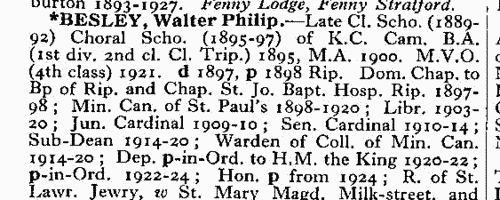
| London Marriage Allegations
(1611-1660)
London, Essex and part of Hertfordshire lay within the diocese of London. In the later 17th century the individual archdeaconry courts issued marriage licences, but for this period the only surviving material is from the overarching London Consistory court. The main series of marriage allegations from the consistory court was extracted by Colonel Joseph Lemuel Chester, and the text was edited by George J. Armytage and published by the Harleian Society in 1887. A typical later entry will give date; name, address and occupation of groom; name, address and condition of his intended bride, and/or, where she is a spinster, her father's name, address and occupation. Lastly we have the name of the church where the wedding was going to take place. For the later years Colonel Chester merely picked out items that he thought were of interest, and his selections continue as late as 1828, but the bulk of the licences abstracted here are from the 17th century.BILL. Cost: £4.00.  | Sample scan, click to enlarge

| Massachusetts Criminals, Litigants, Lawyers and Jurors
(1673-1692)
The only surviving complete volume of the records of the courts held by the Governor and Assistants of the Colony of the Massachusetts Bay is for the period 1673 to 1692. It was transcribed by John Noble, and published by order of the Board of Aldermen of the City of Boston, New England, as County Commissioners of the County of Suffolk, Massachusetts. Under English law overseas colonies were generally deemed to fall under the jurisdiction of the Admiralty, and were subject to English law varied by local circumstances. These Courts of Assistants therefore also function as Courts of Admiralty; the courts had jurisiction over criminal cases and also in civil disputes between parties. In practice, many of the names that occur in the record are just those of the members of the grand jury and the lesser juries (appointed from among the adult male householders of the colony) before whom the cases were tried.BILL. Cost: £4.00.  | Sample scan, click to enlarge
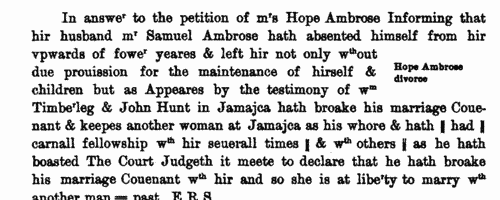
| PCC Probates and Administrations
(1646)
The Prerogative Court of Canterbury's main jurisdiction was central and southern England and Wales, as well as over sailors &c dying abroad: these brief abstracts, compiled under the title "Year Books of Probates", and printed in 1906, usually give address, date of probate and name of executor or administrator. They are based on the Probate Act Books, cross-checked with the original wills, from which additional details are, occasionally, added. The original spelling of surnames was retained, but christian and place names have been modernised where necessary.BILL. Cost: £2.00.  | Sample scan, click to enlarge
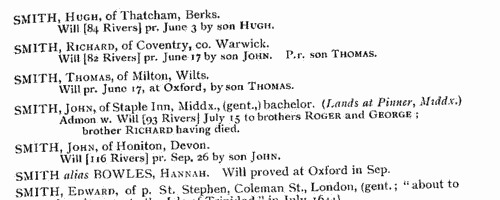
| London funerals and other news
(1550-1563)
Henry Machyn was a citizen and merchant-taylor of London. He had a professional interest in the lavish funerals of his fellow citizens, and in October 1550 started a note book giving brief details of these occasions. Soon he added political news, and (in an age before newspapers) he had a journalist's eye for accidents, hangings, the preachings and suppression of heretics, and the fortunes and misfortunes of dissidents. He lived in interesting times; the early death of Edward VI; the failed attempt to install Jane on the throne; the succession of queen Mary, and a lurch towards Catholicism; her marriage to Philip of Spain; her death, and the accession of queen Elizabeth. Machyn's humble journal, written for his own amusement and with a resolute indifference to orthography, became in its time an important historical source, used by Strype, and then edited by John Gough Nichols for the Camden Society and published in 1848.BILL. Cost: £4.00.  | Sample scan, click to enlarge

| Boys entering Wellington College in Berkshire
(1866)
Wellington College, near Wokingham, was originally founded for the education of sons of military officers. A register of boys entering the school from First Term 1859 to Michaelmas 1933 was compiled by F. G. Lawrence for the Old Wellingtonian Society. In each entry the boy's name is given in full, in bold, surname first; age at entry (usually 11 to 14); then, in brackets, the name of the dormitory or house to which he belonged, in italics, with the years of his stay; then his father's name (usually surname and initials, but not christian name) with military decorations where appropriate. School prefects and captains are noted as such; if the boy played cricket for the school, XI with the years; academic honours, scholarships, &c.; a brief biography; and date of death, or (where known) address in 1933. Year of marriage is given, and sometimes the wife's name and/or her father's name. Clearly, those boys who kept contact with the school and/or had distinguished military careers have detailed entries; others disappeared into oblivion on leaving.BILL. Cost: £6.00.  | Sample scan, click to enlarge
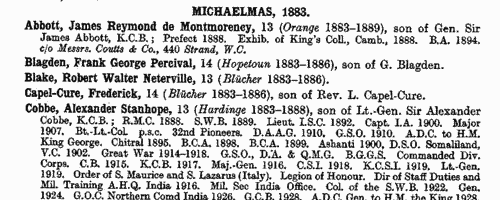
|
Research your ancestry, family history, genealogy and one-name study by direct access to original records and archives indexed by surname.
|












